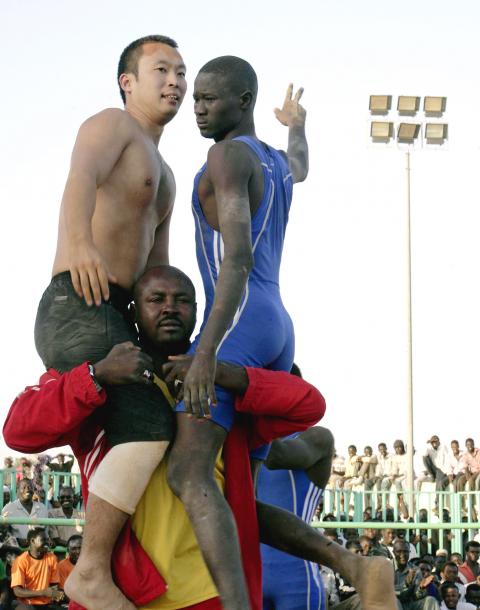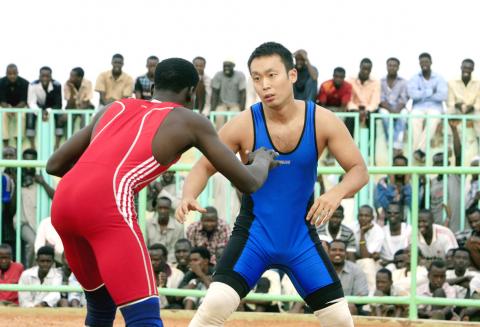In the thousands of years of Sudanese Nuba wrestling history, there had never been anything like it: A barefoot Japanese diplomat in a tight-fitting blue singlet stepping onto the sandy pitch to take on Sudan’s toughest.
Four times this year, Yasuhiro Murotatsu has challenged the Sudanese. Four times he has lost.
However, “Muro” is not giving up.

Photo: AFP
He says his wrestling diplomacy highlights this “precious culture” and can help unite a divided country.
The Nuba Mountains of South Kordofan state are home to a linguistically and religiously diverse group of people collectively known as “Nuba.”
Wrestling is central to their farm-based society, but for more than two years a more modern form of combat has devastated the region.

Photo: AFP
Non-Arab rebels from South Kordofan have joined with other insurgents from Darfur, in Sudan’s west, in rising against the Arab-dominated regime which they complain has marginalized the regions.
“Sudanese wrestling can be a symbol of a united Sudan,” says Murotatsu, 33, a Japanese embassy political officer who tries to spend one hour a day training for his bouts.
“That’s why I am fighting. This is very important. I will be very happy if all tribes ... come to Haj Yousef to support Sudanese wrestling. This is my intention,” he said before his latest match at the stadium in the Khartoum district.
More than 1 million people in South Kordofan and Blue Nile states have been displaced or severely affected by fighting in the area, the UN says.
At the same time in Darfur, tribal violence has worsened this year, leaving hundreds dead and uprooting hundreds of thousands more.
Murotatsu has competed since February in special “friendship” matches during the regular Friday evening card in Haj Yousef, a poor neighborhood of mud-brick houses.
He says the Sudanese sport is similar to the more widely known freestyle wrestling, in which he finished among the top eight when he was in junior-high school.
“I read about wrestling in Nuba Mountains before I came to Sudan ... I became quite interested and wanted to challenge them. I thought that I could win,” says Murotatsu, a former oil industry administrator who is fluent in Arabic.
“I think I’m good,” he proclaimed in an interview before his latest match.
Murotatsu’s opponent is a thin, muscular high-school student, Saleh Omar Bol Tia Kafi, who says he has been wrestling since the age of 12.
“I would come to the ring, watch the matches, and after that I wrestled with other young boys,” says Kafi, 18.
He competes under the nickname “al-Mudiriya,” the same moniker used by his father, a wrestler who is “one of the heroes of the Nuba Mountains” — and Kafi’s inspiration.
Nuba men would hold impromptu matches while in the fields caring for their cows, Kafi says, wearing a tracksuit in the colors of the Sudanese flag.
Kafi came to Khartoum from the Nuba region at the age of eight. He lives with his family, but some relatives who remained in South Kordofan have fled to the mountains because of the fighting, he says.
The war has hit the sport hard in its Nuba homeland, but wrestling still takes place, officials say.
It is now formally known as “Sudanese” wrestling because it has grown beyond the Nuba community, says Hassan Abu Ras Saliem, deputy head of the local wrestling federation.
“We are fully convinced that this wrestling can unite Sudan,” says al-Tayeb Ahmed Ajoan, the federation’s secretary-general.
And that is Muro’s wish, as he sits on the edge of the circular red-earth pitch, stretching before his latest match.
Fans have taken up every inch of the stadium, which was built by the Khartoum state government a year ago.
They even perch atop the concrete wall, moving to the rhythmic music played between bouts.
Small boys lugging plastic containers of drinking water and silver cups squeeze through the crowd, while women sell trays of snacks.
Far away, people are fighting and dying in Sudan’s wars, but in the stadium, fans from different parts of the country have come together in joy.
“I think this wrestling can have a role in ending racism in Sudan,” said Mutasim Ahmed, who is from North Kordofan and is a regular spectator.
A Darfur native, Abdurrahman Tajideen, said he supported local boy Mudiriya because “he is representing Sudan.”
The widening appeal of the sport to people like Tajideen from other ethnic groups means it could help bring peace to the country and the Nuba region in particular, said wrestling fan Hafiz Sulaiman, a Nuba.
Sulaiman was hoping for a Muro victory “because he lost three matches and still came back. This means he has good will.”
Hands raised, concentrating in a half-crouch, the two wrestlers move cautiously, pawing each other like cats as the match begins.
The pace picks up. Mudiriya holds Muro around the waist and pulls him into the dirt before the Japanese twists around.
Mudiriya is on his back. Muro raises his arms, as if in victory.
No, not yet.
They play on, Mudiriya’s left shoulder dusted with dirt.
After about three minutes he puts Muro on the ground again. Game over. Mudiriya wins.
“A lion! He’s a lion!” a female fan calls in his honor as the two athletes are hoisted up by others.
“Muro’s tactics were completely different from last time and his skill has improved,” a sweating Mudiriya says.
“He’s a very good wrestler,” the Japanese diplomat says, vowing a return to the ring.
“I cannot withdraw until I get at least one victory,” he adds.
A win in Khartoum would, he hopes, pave the way for a bout in the wrestling heartland of Nuba itself.
“It will be a very good message for peace,” Murotatsu says.

OPTIMISTIC: A Philippine Air Force spokeswoman said the military believed the crew were safe and were hopeful that they and the jet would be recovered A Philippine Air Force FA-50 jet and its two-person crew are missing after flying in support of ground forces fighting communist rebels in the southern Mindanao region, a military official said yesterday. Philippine Air Force spokeswoman Colonel Consuelo Castillo said the jet was flying “over land” on the way to its target area when it went missing during a “tactical night operation in support of our ground troops.” While she declined to provide mission specifics, Philippine Army spokesman Colonel Louie Dema-ala confirmed that the missing FA-50 was part of a squadron sent “to provide air support” to troops fighting communist rebels in

Two daughters of an Argentine mountaineer who died on an icy peak 40 years ago have retrieved his backpack from the spot — finding camera film inside that allowed them a glimpse of some of his final experiences. Guillermo Vieiro was 44 when he died in 1985 — as did his climbing partner — while descending Argentina’s Tupungato lava dome, one of the highest peaks in the Americas. Last year, his backpack was spotted on a slope by mountaineer Gabriela Cavallaro, who examined it and contacted Vieiro’s daughters Guadalupe, 40, and Azul, 44. Last month, the three set out with four other guides

ECONOMIC DISTORTION? The US commerce secretary’s remarks echoed Elon Musk’s arguments that spending by the government does not create value for the economy US Secretary of Commerce Howard Lutnick on Sunday said that government spending could be separated from GDP reports, in response to questions about whether the spending cuts pushed by Elon Musk’s Department of Government Efficiency could possibly cause an economic downturn. “You know that governments historically have messed with GDP,” Lutnick said on Fox News Channel’s Sunday Morning Futures. “They count government spending as part of GDP. So I’m going to separate those two and make it transparent.” Doing so could potentially complicate or distort a fundamental measure of the US economy’s health. Government spending is traditionally included in the GDP because

Sri Lanka’s fragile economic recovery could be hampered by threatened trade union strikes over reduced benefits for government employees in this year’s budget, the IMF said yesterday. Sri Lankan President Anura Kumara Dissanayake’s maiden budget raised public sector salaries, but also made deep cuts to longstanding perks in a continuing effort to repair the island nation’s tattered finances. Sri Lanka’s main doctors’ union is considering a strike from today to protest against cuts to their allowances, while teachers are also considering stoppages. IMF senior mission chief for Sri Lanka Peter Breuer said the budget was the “last big push” for the country’s austerity